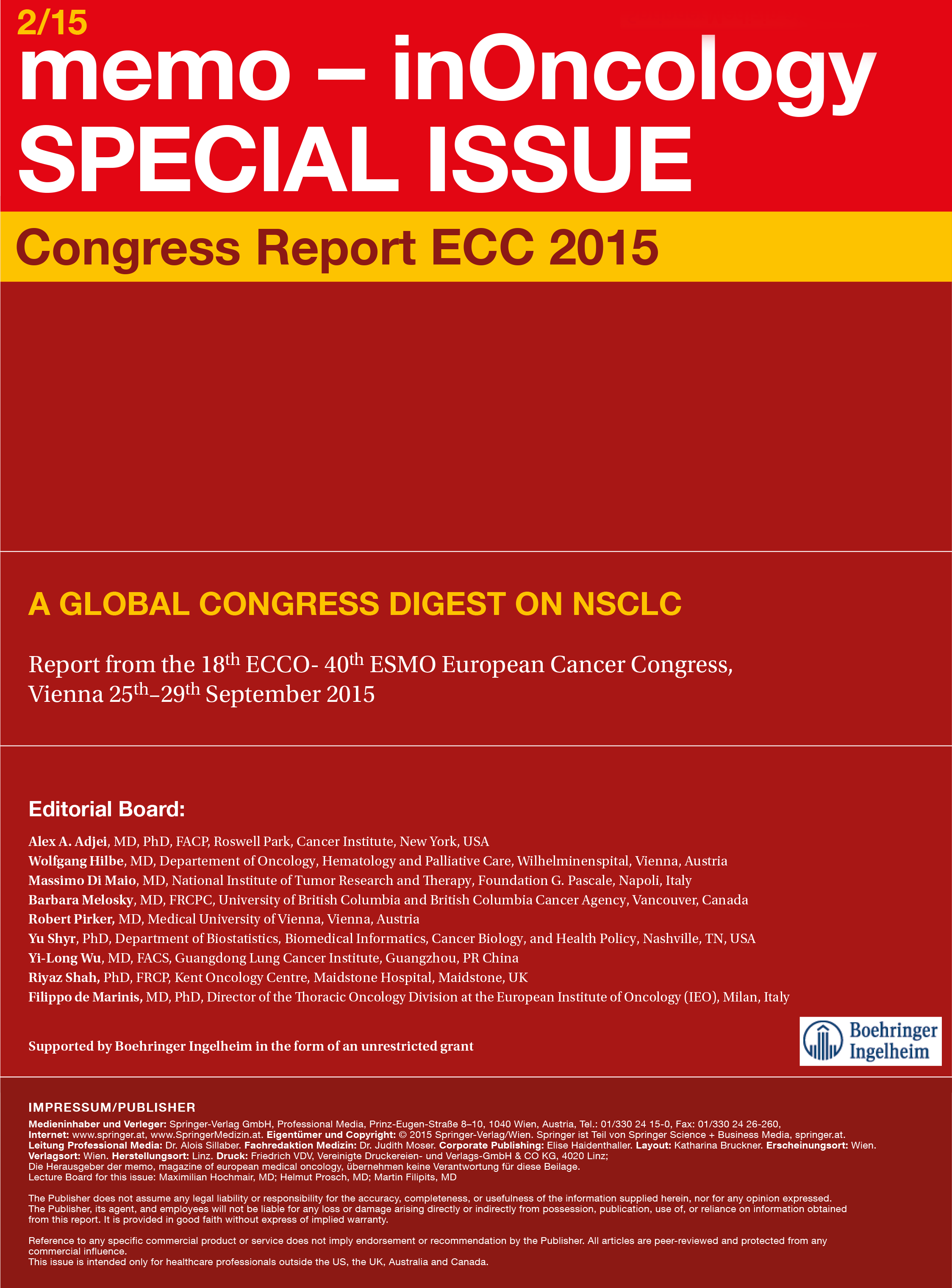ECC 2015 – Vienna
Medical Writer: Judith Moser, MD
Preface – ECC 2015
Preface – ECC 2015 Robert Pirker, MD, Medical University of Vienna, Vienna, Austria
News on targeted agents in the advanced setting
News on targeted agents in the advanced setting Afatinib in squamous-cell carcinoma: update of LUX-Lung 8 Squamous-cell carcinoma of the lung represents approximately 30 % of non–small-cell lung cancer (NSCLC) cases. Until 2015, docetaxel and erlotinib were the only approved second-line treatment options in these patients.
Interview: Liquid biopsy is a revolution
Liquid biopsy is a revolution Filippo de Marinis, MD, PhD, Director of the Thoracic Oncology Division at the European Institute of Oncology (IEO), Milan, Italy
Pivotal results and sub-analyses in the field of immunotherapy
Pivotal results and sub-analyses in the field of immunotherapy CheckMate 017: favourable quality-of-life outcomes Binding of the inhibitory receptor PD-1 to its ligands, PD-L1 and PD-L2, inhibits T-cell responses. This pathway can be exploited by tumours to escape T-cell-induced anti-tumour activity. Therefore, it is a target for antibodies designed to block this mechanism, with the aim of enhancing immune responses.
Interview: Immunotherapy has opened up a new avenue of research
“Immunotherapy has opened up a new avenue of research” Riyaz Shah, PhD, FRCP, Kent Oncology Centre, Maidstone Hospital, Maidstone, UK
Lung cancer screening: diagnosis in the nick of time
Lung cancer screening: diagnosis in the nick of time Lung cancer is the leading cause of cancer mortality worldwide. Only 16 % of patients survive for 5 years, compared to 89 % with breast cancer and almost 100 % with prostate cancer.
Genomic testing – becoming part of everyday practice
Genomic testing – becoming part of everyday practice Prediction of node negativity with a view to sublobar resection As patients with node-negative early lung cancer might be ideal candidates for sublobar resection, predictors of pathological node-negative disease were investigated in a cohort of patients with clinical stage IA NSCLC [1].
Optimising treatment in local and regional lung cancer
Optimising treatment in local and regional lung cancer Prediction of node negativity with a view to sublobar resection As patients with node-negative early lung cancer might be ideal candidates for sublobar resection, predictors of pathological node-negative disease were investigated in a cohort of patients with clinical stage IA NSCLC [1].
Small-cell lung cancer: established and novel approaches
Small-cell lung cancer: established and novel approaches Small-cell lung cancer (SCLC) accounts for 14 % of all lung cancers. It is initially sensitive to chemotherapy and radiation therapy, but resistance tends to develop rapidly, which leads to high recurrence rates.
Significant therapeutic advances were also shown for the immune checkpoint inhibitors nivolumab and pembrolizumab, while new representatives of this drug class, such as atezolizumab, are well on their way. Nivolumab also excelled in the treatment of patients with small-cell lung cancer. However, the patient selection through predictive biomarkers still needs further research with regard to these novel immunotherapeutics.





